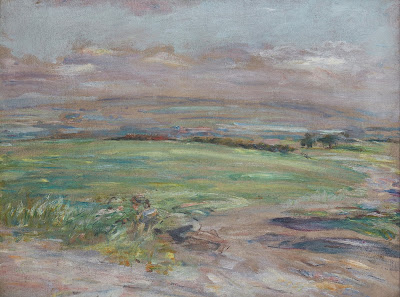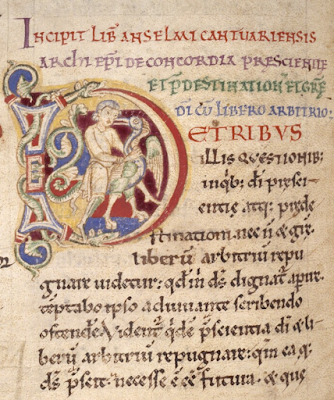Weekly update 8
 |
| James Paterson, Edinburgh from Craigleith |
This painting is part of an exhibition of the Glasgow Boys at The Fine Art Society in Edinburgh. (A lot of my images lately have been from that exhibition.) I had hoped to see it in person, but it closes a week from today, and restrictions on travel from the US to Scotland are still too prohibitive. I won't make it to Scotland at all this summer, but I'm taking a few days to get a change of scenery a little closer to home, including a week to ten days of focused work at the library at General Theological Seminary.
My main job this week was to get started on Chapter 1, "Anselm's life, work, and contexts." I was planning to save it for last because it will be the most difficult to write, but after drafting Chapters 2-4 I realized that I need the first chapter to make my list of illustrations, which currently requests "a map or maps including all the places mentioned in Chapter 1." That list is due to the press, well, two days ago; if I can get the chapter done and the list of illustrations sent to the press by Friday of next week, I will be close enough.
This week's excerpt is the beginning of Chapter 1. I decided to start with Anselm's becoming archbishop of Canterbury, because all the different contexts of his life and work make an appearance in this one story. It's the best way I know to set up all the major themes in about five hundred words before diving into the details.
*****
In September of
1092, a fifty-nine-year-old Benedictine abbot, well-known for his theological
acumen and his spiritual guidance to kings, nobles, priests, and monks, found
himself in England, attending to the overseas dependencies of his abbey in
Normandy. It was a somewhat tricky time for Abbott Anselm to be in England,
because he was in the eyes of many the obvious successor to his former teacher
Lanfranc as archbishop of Canterbury, and Anselm did not want to appear to be
angling for the job. But his old friend Hugh, earl of Chester, was ill and very
much wanted to see Anselm before he died, both for his own spiritual comfort
and to discuss a monastery he wanted to found at Chester under Anselm’s
supervision. So Anselm went.
Lanfranc had died more than three
years earlier in May of 1089, but the king, William II, had not appointed
anyone to succeed him: it suited the king to keep bishoprics vacant so that he could
use church revenues to fund his military operations in Scotland and Wales. He
felt no urgency about naming a new archbishop until March 1093, when he fell
ill; fully expecting to die, he wanted to get right with God and the Church
while he had time. The royal court was then at Gloucester, and, as it happened,
Anselm’s business in England had taken him to a village nearby. So Anselm was
summoned to administer last rites and hear the king’s confession. It may be
that a promise from the king to fill the vacant archbishopric was a condition
of absolution—we can’t really know that part—but certainly the topic arose, and
the king immediately named Anselm as his choice.
Anselm was horrified. He begged,
pleaded, wept, protested—his biographer tells us that Anselm’s nose bled from
the stress—but to no avail. The king and bishops, even Anselm’s own retinue,
insisted that he accept. Anselm clenched his hand to avoid receiving the
pastoral staff that the king was trying to thrust upon him, so the bishops
pried his fingers apart and then closed them around the staff. Anselm was
carried into the church to cries of “Long live the bishop!” (Vivat episcopus!)
and the singing of the hymn Te Deum laudamus, while he kept protesting Nihil
est quod facitis: “What you are doing is nothing.” But however desperately
Anselm may have wished that it all come to nothing, he was not to have his way,
and by August of 1093 he had accepted the archbishopric of Canterbury. It would
prove to be a vexatious job in many ways, but he held it for the rest of his
life.



Vexatious!
ReplyDelete